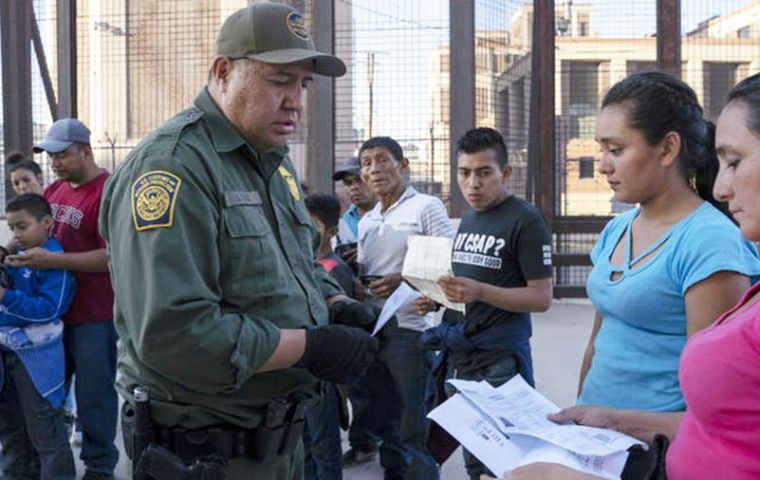MercoPress. South Atlantic News Agency
Trump latest: “wealth test” rule for immigrants could deny visas and residency to thousands of poor applicants
 The government estimates the status of 382,000 immigrants could immediately be reviewed on those grounds
The government estimates the status of 382,000 immigrants could immediately be reviewed on those grounds U.S. President Donald Trump’s administration unveiled a sweeping rule on Monday that some experts say could cut legal immigration in half by denying visas and permanent residency to hundreds of thousands of people for being too poor.
The long-anticipated rule, pushed by Trump’s leading aide on immigration, Stephen Miller, takes effect Oct. 15. It would reject applicants for temporary or permanent visas if they fail to meet high enough income standards or if they receive public assistance such as welfare, food stamps, public housing or Medicaid.
“The Trump administration is trying to bypass Congress and implement its own merit based-immigration system. It’s really a backdoor way of prohibiting low-income people from immigrating,” said Charles Wheeler of the Catholic Legal Immigration Network Inc.
The rule is part of Republican Trump’s efforts to curb both legal and illegal immigration, an issue he has made a cornerstone of his presidency.
After the rule was announced, the National Immigration Law Center (NILC) said it would file a lawsuit to stop it from taking effect. The group’s executive director said the rule was racially motivated. The state attorneys general of California and New York threatened to sue.
The 837-page rule, seeking to target those who could become “public charges” in the United States, could be the most drastic of all the Trump administration’s policies targeting the legal immigration system, experts have said. It could deny visas to people for not making enough money or who are drawing public benefits.
The government estimates the status of 382,000 immigrants could immediately be reviewed on those grounds. Immigrant advocates fear the real number could be much higher, especially if the rule is extended to the millions of people who apply for U.S. visas at American consulates around the world.
The State Department already changed its foreign affairs manual in January 2018 to give diplomats wider discretion in deciding visa denials on public charge grounds. In the fiscal year that ended last September, the number of visas denied on those grounds quadrupled compared to the previous year.
“This is an end run around Congress to achieve through executive fiat what the administration cannot get through Congress,” said Doug Rand, co-founder of Boundless, a pro-migrant group that helps families navigate the U.S. immigration system.
The rule is intended to scare immigrants away from using public benefits to which they are legally entitled, Rand said, adding that a study by Boundless found it could eliminate more than half of visa applicants.
A 2018 study by the Migration Policy Institute found 69 percent of already established immigrants had at least one negative factor against them under the administration’s wealth test, while just 39 percent had one of the heavily weighed positive factors.
Other immigrant advocates have expressed concern the rule could negatively affect public health by dissuading immigrants from using health or food aid. The Trump administration estimates its rule will save US$ 2.47 billion annually in spending on public benefits.
The rule is derived from the Immigration Act of 1882, which allows the U.S. government to deny a visa to anyone likely to become a “public charge.”




Top Comments
Disclaimer & comment rulesCommenting for this story is now closed.
If you have a Facebook account, become a fan and comment on our Facebook Page!